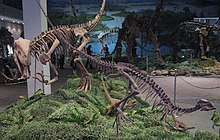Agilisaurus
|
Agilisaurus Temporal range: Middle Jurassic, 168–161 Ma |
|
|---|---|
 |
|
| Mounted skeleton on the right, at the Zigong museum | |
| Scientific classification | |
| Kingdom: | Animalia |
| Phylum: | Chordata |
| Class: | Reptilia |
| Clade: | Dinosauria |
| Order: | †Ornithischia |
| Clade: | †Genasauria |
| Clade: | †Neornithischia |
| Genus: |
†Agilisaurus Peng, 1990 |
| Species: | †A. louderbacki |
| Binomial name | |
|
Agilisaurus louderbacki Peng, 1990 |
|
Agilisaurus (/ˌædʒᵻlᵻˈsɔːrəs/; 'agile lizard') is a genus of ornithischian dinosaur from the Middle Jurassic Period of what is now eastern Asia. The name is derived from the Latin "agilis" meaning 'agile' and the Greek "sauros" meaning 'lizard', and refers to the agility suggested by its lightweight skeleton and long legs. Its tibia (lower leg bone) 207.0 mm in length, was longer than its femur (upper leg bone) 199.0 mm in length, which indicates that it was an extremely fast bipedal runner, using its long tail for balance, although it may have walked on all fours when browsing for food. It was a small herbivore, about 1.2 meters (4 feet) in length, and like all ornithischians, it had a beak-like structure on the ends of both upper and lower jaws to help it crop plant material.
There is one named species (A. louderbacki), named after Dr. George Louderback, an American geologist and the first to recognize dinosaur fossils from the Sichuan Province of China in 1915. Both genus and type species were named by Chinese paleontologist Peng Guangzhou in very brief fashion in 1990, then described in further detail by Peng in 1992.
...
Wikipedia
